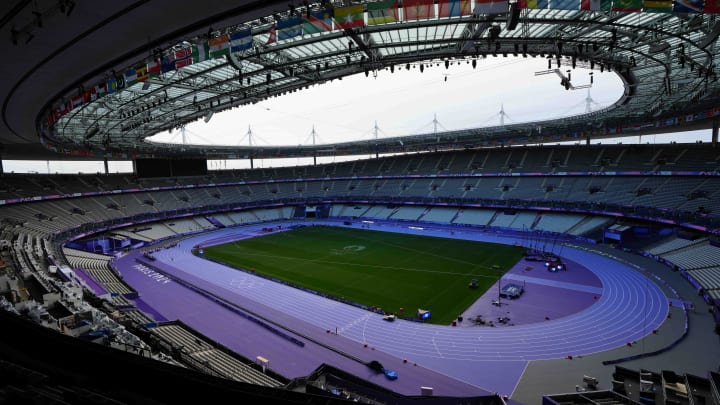What is a Decathlon? Every Sport in the Event

It's hard enough to qualify for the Olympic Games in one event. How about qualifying for 10?
That's essentially what Decathlon athletes are tasked with doing, as the combined event is made up of 10 different track and field events, with the combined score determining who takes home the gold, silver and bronze medals.
It's a grueling schedule for the athletes that participate as it spans over two days that jam-pack the 10 events into a brutal schedule. Already, at the Paris Games, the decathlon is underway.
Events in the Men's Decathlon
These are the 10 events in the Decathlon:
1. 100m race
2. Long jump
3. Shot put
4. High jump
5. 400m race
6. 110m hurdles
7. Discus throw
8. Pole vault
9. Javelin throw
10. 1500m
How Does Decathlon Scoring Work?
Scoring for the Decathlon is derived from a formula that—as you would expect—awards higher scores for faster times on track events and higher scores for greater distances or heights on-field events. The formula is a bit much to use as a guide for following along leisurely, but it essentially scales each event against a base score and builds it into the full score for the event. But if you're into that, this website has an IAAF scoring calculator.
Simpler, per World Athletics, here is the performance needed in each event to score 1,000 points in each:
Event | Performance |
|---|---|
100m | 10.39 seconds |
Long jump | 7.76m |
Shot put | 18.40m |
High jump | 2.21m |
400m | 46.17 seconds |
110m hurdles | 13.80 seconds |
Discus | 56.17m |
Pole vault | 5.29m |
Javelin | 77.19m |
1500m | 3:53.79 |
Why is There No Women's Decathlon?
In the Olympic Games, there is no women's Decathlon. The closest equivalent is the seven-event combined event called a heptathlon. The most straightforward answer for why there is no women's decathlon is that it hasn't caught storm with the Olympics yet. The event is staged for women in other world competitions, a relatively recent development, with the World Athletics approving scoring tables in 2001.
Critics have called the absence of a women's decathlon (or an open competition) sexist. World Athletics published a paper saying the decathlon is, "one of the last fortresses of male athletics," over 20 years ago. The practical reasons given for the lack of a women's decathlon have historically been around cost and—long ago—safety. In the early 1900s, women were barred from many events in the athletics portion of the Games over a false narrative that physical exercise was dangerous for women.
Also practically speaking, if and when the event is approved for the Olympics, it is no small task to add extra events for athletes that would wish to participate. A heptathlon athlete detailed how hard it would be to expand one athlete's range to work up to a decathlon.
"It's a whole other beast than the heptathlon. If you look at the end of a decathlon, it looks like the guys have been massacred. I imagine you really feel the three extra events," Kendell Williams, a Pentathlon bronze medalist at the 2022 World Indoor Championships said.
The decathlon is one of two remaining inequitable events between the men's and women's, the other being sprint hurdles which take place over 110m for men and 100m for women.
